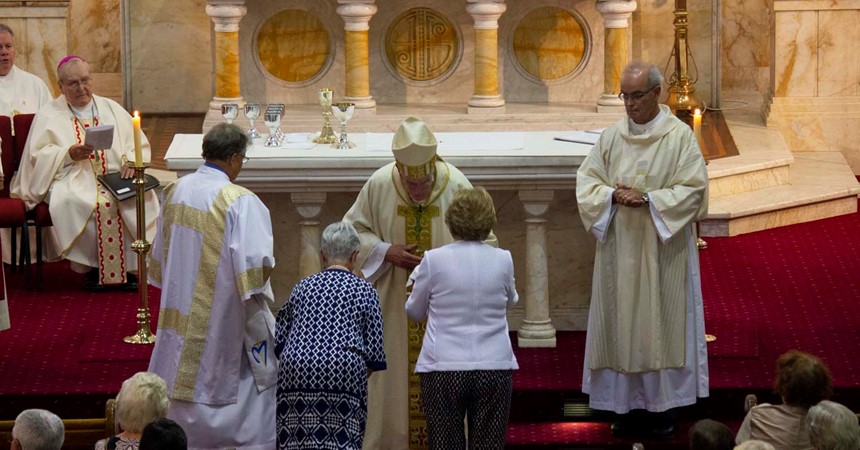The question ‘What’s in a name?’ asked by Juliet in Shakespeare’s Romeo and Juliet has taken on a life of its own beyond the historical context of the play. We often hear people ask this question in all sorts of situations. It is a good place to begin our reflection on what the General Instruction of the Roman Missal (GIRM) calls the ‘Preparation of the Gifts’.
This name is important. Commonly and wrongly, we call this part of the Mass ‘The Offertory’. While the word ‘offerings’ is an alternative to the word ‘gifts’, as is seen in the language of the GIRM (a. 73) and the rubrics of the missal (a. 22), there is no ‘offertory’ or ‘offering’ at this point. That takes place during the Eucharistic Prayer. The name of this element of the Mass reveals its nature as preparatory. At the same time, it is the essential first part of the eucharistic action. The offering which is to come can only take place if there is something to be offered.
As we have done before we will turn our attention to the liturgical texts to help us reflect more deeply on what we are doing together when we ‘celebrate’ the ‘Preparation of the Gifts’. Once again you are invited to use our three mystagogical questions to guide your reflection:
- What did you notice?
- What does it reveal to you/us (about God, Christ, the church, the liturgy …)?
- What does it ask of you/us?
The prayers that are prayed with the gifts we – the faithful – present are as follows.
- The Priest, standing at the altar, takes the paten with the bread and holds it slightly raised above the altar with both hands, saying in a low voice:
Blessed are you, Lord God of all creation,
for through your goodness we have received
the bread we offer you:
fruit of the earth and work of human hands,
it will become for us the bread of life.
Blessed be God for ever.
- The Deacon, or the Priest, pours wine and a little water into the chalice, saying quietly:
By the mystery of this water and wine
may we come to share in the divinity of Christ
who humbled himself to share in our humanity.
- The Priest then takes the chalice and holds it slightly raised above the altar with both hands, saying in a low voice:
Blessed are you, Lord God of all creation,
for through your goodness we have received
the wine we offer you:
fruit of the vine and work of human hands,
it will become our spiritual drink.
Blessed be God for ever.
- After this, the Priest, bowing profoundly, says quietly:
With humble spirit and contrite heart
may we be accepted by you, O Lord,
and may our sacrifice in your sight this day
be pleasing to you, Lord God.
- If appropriate, he also incenses the offerings, the cross, and the altar. A Deacon or other minister then incenses the Priest and the people.
- Then the Priest, standing at the side of the altar, washes his hands, saying quietly:
Wash me, O Lord, from my iniquity
and cleanse me from my sin.
‘The Preparation of the Gifts’ then flows seamlessly into the next element, ‘The Prayer over the Offerings’
- Standing at the middle of the altar, facing the people, extending and then joining his hands, he says:
Pray, brethren (brothers and sisters),
that my sacrifice and yours
may be acceptable to God,
the almighty Father.
The people rise and reply:
May the Lord accept the sacrifice at your hands
the praise and glory of his name,
for our good
and the good of all his holy Church.
Receive, O Lord, the sacrifice of conciliation and praise
and grant that, cleansed by its action,
we may make [an] offering of a heart pleasing to you.
Through Christ our Lord.
Amen
[Prayer Over the offerings for the 12th Sunday in Ordinary Time year A]
We are limping in our reflection on this rite because the action and the symbols are as important as the text. Liturgy is sacramental in nature. Everything we do and see and say and hear and smell and taste is a doorway through which we encounter the mystery of God’s love revealed in Jesus’ death and resurrection. So in addition to reflecting on the texts, try to imagine what you are seeing and paying attention to as a member of the Assembly.
In your reflection, what did you notice? What is God revealing to you? Are we celebrants or consumers?
As celebrants we watch members of the Assembly – our brothers and sisters – present the bread and wine to the presider. These are symbols that acknowledge everything as a gift from God AND that represent our very lives – the work of our human hands. With the bread and wine, we place our lives and our world, our joys and our sorrows, our griefs and anxieties on the altar to be joined to Christ’s paschal action. As celebrants we come to eucharist with our hands and hearts full, ready to offer ourselves. We can only receive at communion because we have first given who we are, not only as individuals, but primarily as the community of the faithful.
As celebrants we are attentive to the language of the prayers prayed in our name. The pronouns are plural. I love the prayer we rarely hear because the presider prays it quietly:
With humble spirit and contrite heart
may we be accepted by you, O Lord,
and may our sacrifice in your sight this day
be pleasing to you, Lord God.
This rich understanding of what we are doing at the ‘Presentation of the Gifts’ is gathered into a. 73 of the GIRM which says that it is ‘… a praiseworthy practice for the bread and wine to be presented by the faithful.’
To come to the ‘Presentation of the Gifts’ as consumers is to be attentive to the ritual action as something separate to ourselves, something that we observe rather than something we are part of.
As celebrants we appreciate the ‘Preparation of the Gifts’ as the essential first part of the eucharistic action that is done by the faithful, specifically by the fully initiated. As consumers we experience the ‘Preparation of the Gifts’ as preliminary to, rather than part of the main event. As preliminary to rather than part of the Eucharistic action, we think anyone can present the gifts, including those who are other than Catholic or not fully initiated.
Are we celebrants or consumers? What is the gift being prepared for offering? Who is the gift being prepared for offering? The answer matters. Our reflection on this first moment in the four-part eucharistic action helps us deepen our appreciation of the serious limitations of live-streamed Masses. It also opens our eyes to the way that poor ritual action and minimalised symbols compromises the effectiveness of the liturgy in revealing the God of Jesus Christ, and in shaping our identity as members of the Body of Christ for mission.
We have missed more than we can really appreciate with the emphasis on live-streamed Mass during these COVID-19 times. As we begin to gather again for the public celebration of the liturgy, many are asking how we can better celebrate the Eucharist so that we experience the love of God revealed in Christ and are changed by that experience. Change starts with me and my participation in what Jesus asked us to do in his memory. To what change is the Holy Spirit calling you? To what change is the Holy Spirit calling us?
Imagine what the Church community would be like if we were all celebrants! As the liturgical text says, we need to be celebrants, not only for our good but for the good of the Church whose mission is to reveal the love of God in the world.
In the next Liturgy Matters we will focus on the second of the four-part action – the Eucharistic Prayer.
You might like to watch again an interview Michael Kelly sj facilitated on virtual Mass.
Acknowledgements
Prayers and references to the General Instruction of the Roman Missal are from the English Translation of the Roman Missal © 2010 International Committee on English in the Liturgy Inc. (ICEL). All rights reserved.
Photo: © Diocese of Maitland-Newcastle. All rights reserved.

